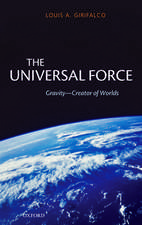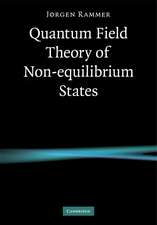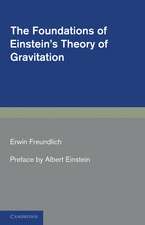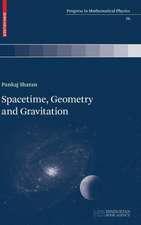Extracting Physics from Gravitational Waves: Testing the Strong-field Dynamics of General Relativity and Inferring the Large-scale Structure of the Universe: Springer Theses
Autor Tjonnie G. F. Lien Limba Engleză Paperback – 15 oct 2016
In another section, Li's thesis deals with cosmology, describing an exploratory study where the possibility of cosmological parameters measurement through gravitational wave compact binary coalescence signals associated with electromagnetic counterparts is evaluated. In particular, the study explores the capabilities of the future Einstein Telescope observatory. Although of very long term-only applicability, this is again a thorough investigation, nicely put in the context of the current and the future observational cosmology.
| Toate formatele și edițiile | Preț | Express |
|---|---|---|
| Paperback (1) | 638.76 lei 6-8 săpt. | |
| Springer International Publishing – 15 oct 2016 | 638.76 lei 6-8 săpt. | |
| Hardback (1) | 644.95 lei 6-8 săpt. | |
| Springer International Publishing – 15 iul 2015 | 644.95 lei 6-8 săpt. |
Din seria Springer Theses
- 18%
 Preț: 997.88 lei
Preț: 997.88 lei -
 Preț: 389.88 lei
Preț: 389.88 lei - 15%
 Preț: 646.94 lei
Preț: 646.94 lei - 18%
 Preț: 943.43 lei
Preț: 943.43 lei -
 Preț: 399.29 lei
Preț: 399.29 lei - 18%
 Preț: 944.99 lei
Preț: 944.99 lei - 15%
 Preț: 636.80 lei
Preț: 636.80 lei - 18%
 Preț: 941.05 lei
Preț: 941.05 lei - 15%
 Preț: 643.16 lei
Preț: 643.16 lei - 15%
 Preț: 642.68 lei
Preț: 642.68 lei - 18%
 Preț: 1103.62 lei
Preț: 1103.62 lei - 20%
 Preț: 558.82 lei
Preț: 558.82 lei - 18%
 Preț: 1112.30 lei
Preț: 1112.30 lei - 18%
 Preț: 944.19 lei
Preț: 944.19 lei - 18%
 Preț: 1109.92 lei
Preț: 1109.92 lei - 18%
 Preț: 1217.27 lei
Preț: 1217.27 lei - 15%
 Preț: 640.06 lei
Preț: 640.06 lei - 15%
 Preț: 636.45 lei
Preț: 636.45 lei - 15%
 Preț: 640.06 lei
Preț: 640.06 lei - 15%
 Preț: 640.88 lei
Preț: 640.88 lei -
 Preț: 389.70 lei
Preț: 389.70 lei - 20%
 Preț: 563.89 lei
Preț: 563.89 lei -
 Preț: 393.35 lei
Preț: 393.35 lei - 15%
 Preț: 637.93 lei
Preț: 637.93 lei - 15%
 Preț: 641.85 lei
Preț: 641.85 lei - 18%
 Preț: 1225.94 lei
Preț: 1225.94 lei - 20%
 Preț: 551.36 lei
Preț: 551.36 lei - 18%
 Preț: 1229.10 lei
Preț: 1229.10 lei - 15%
 Preț: 639.25 lei
Preț: 639.25 lei - 18%
 Preț: 999.45 lei
Preț: 999.45 lei - 15%
 Preț: 640.06 lei
Preț: 640.06 lei - 18%
 Preț: 1220.45 lei
Preț: 1220.45 lei - 18%
 Preț: 1116.26 lei
Preț: 1116.26 lei - 18%
 Preț: 1110.72 lei
Preț: 1110.72 lei - 18%
 Preț: 1000.87 lei
Preț: 1000.87 lei - 18%
 Preț: 891.17 lei
Preț: 891.17 lei - 15%
 Preț: 640.06 lei
Preț: 640.06 lei - 5%
 Preț: 1154.07 lei
Preț: 1154.07 lei - 15%
 Preț: 635.96 lei
Preț: 635.96 lei - 15%
 Preț: 640.88 lei
Preț: 640.88 lei -
 Preț: 387.20 lei
Preț: 387.20 lei - 18%
 Preț: 1109.92 lei
Preț: 1109.92 lei -
 Preț: 385.25 lei
Preț: 385.25 lei -
 Preț: 385.25 lei
Preț: 385.25 lei - 18%
 Preț: 1112.30 lei
Preț: 1112.30 lei - 18%
 Preț: 999.45 lei
Preț: 999.45 lei -
 Preț: 386.99 lei
Preț: 386.99 lei - 15%
 Preț: 637.13 lei
Preț: 637.13 lei - 20%
 Preț: 554.20 lei
Preț: 554.20 lei - 20%
 Preț: 555.57 lei
Preț: 555.57 lei
Preț: 638.76 lei
Preț vechi: 751.47 lei
-15% Nou
Puncte Express: 958
Preț estimativ în valută:
122.22€ • 127.96$ • 101.13£
122.22€ • 127.96$ • 101.13£
Carte tipărită la comandă
Livrare economică 05-19 aprilie
Preluare comenzi: 021 569.72.76
Specificații
ISBN-13: 9783319366647
ISBN-10: 3319366645
Pagini: 261
Ilustrații: XXVI, 235 p. 47 illus., 30 illus. in color.
Dimensiuni: 155 x 235 x 14 mm
Greutate: 0.37 kg
Ediția:Softcover reprint of the original 1st ed. 2015
Editura: Springer International Publishing
Colecția Springer
Seria Springer Theses
Locul publicării:Cham, Switzerland
ISBN-10: 3319366645
Pagini: 261
Ilustrații: XXVI, 235 p. 47 illus., 30 illus. in color.
Dimensiuni: 155 x 235 x 14 mm
Greutate: 0.37 kg
Ediția:Softcover reprint of the original 1st ed. 2015
Editura: Springer International Publishing
Colecția Springer
Seria Springer Theses
Locul publicării:Cham, Switzerland
Cuprins
Part I General Introduction.- Gravitational waves in the linearised theory of General Relativity.- Gravitational waves in the post-Newtonian formalism.- Gravitational waves: detection and sources.- Bayesian Inference.- Computational methods.- Part II Testing the Strong-field Dynamics of General Relativity.- Introduction.- Test Infrastructure for General Relativity (TIGER).- Results.- Discussion.- Part III Inferring the Large-scale Structure of the Universe.- Introduction.- Cosmography.- Electromagnetic counterpart as redshift measurement.- Concluding remarks.- A Systematic multipole expansion.- Bibliography.- Popular-science summary.
Notă biografică
Tjonnie Li is the winner of the 2013 Stefano Braccini Thesis Prize awarded by the Gravitational Wave International Committee. He received his PhD in Physics in 2013 from the University of Amsterdam. He then became a Postdoctoral Fellow at the LIGO Laboratory, California Institute of Technology (USA), developing analyses for detecting binary black holes and explorations into the strong-field regime of gravity. Dr. Li is a member of the LIGO Scientific Collaboration with focus on compact binary systems.
Textul de pe ultima copertă
Tjonnie Li's thesis covers two applications of Gravitational Wave astronomy: tests of General Relativity in the strong-field regime and cosmological measurements. The first part of the thesis focuses on the so-called TIGER, i.e. Test Infrastructure for General Relativity, an innovative Bayesian framework for
performing hypothesis tests of modified gravity using ground-based GW data. After developing the framework, Li simulates a variety of General Relativity deviations and demonstrates the ability of the aforementioned TIGER to measure them. The advantages of the method are nicely shown and compared to other, less generic methods. Given the extraordinary implications that would result from any measured deviation from General Relativity, it is extremely important that a rigorous statistical approach for supporting these results would be in place before the first Gravitational Wave detections begin. In developing TIGER, Tjonnie Li shows a large amount of creativity and originality, and his contribution is an important step in the direction of a possible discovery of a deviation (if any) from General Relativity.
In another section, Li's thesis deals with cosmology, describing an exploratory study where the possibility of cosmological parameters measurement through gravitational wave compact binary coalescence signals associated with electromagnetic counterparts is evaluated. In particular, the study explores the
capabilities of the future Einstein Telescope observatory. Although of very long term-only applicability, this is again a thorough investigation, nicely put in the context of the current and the future observational cosmology.
The author is the winner of the 2013 Stefano Braccini Thesis Prize awarded by the Gravitational Wave International Committee.
performing hypothesis tests of modified gravity using ground-based GW data. After developing the framework, Li simulates a variety of General Relativity deviations and demonstrates the ability of the aforementioned TIGER to measure them. The advantages of the method are nicely shown and compared to other, less generic methods. Given the extraordinary implications that would result from any measured deviation from General Relativity, it is extremely important that a rigorous statistical approach for supporting these results would be in place before the first Gravitational Wave detections begin. In developing TIGER, Tjonnie Li shows a large amount of creativity and originality, and his contribution is an important step in the direction of a possible discovery of a deviation (if any) from General Relativity.
In another section, Li's thesis deals with cosmology, describing an exploratory study where the possibility of cosmological parameters measurement through gravitational wave compact binary coalescence signals associated with electromagnetic counterparts is evaluated. In particular, the study explores the
capabilities of the future Einstein Telescope observatory. Although of very long term-only applicability, this is again a thorough investigation, nicely put in the context of the current and the future observational cosmology.
The author is the winner of the 2013 Stefano Braccini Thesis Prize awarded by the Gravitational Wave International Committee.
Caracteristici
Nominated for Springer Theses by the Gravitational Waves International Committee (GWIC) Winner of Stefano Braccini Thesis Prize 2014 awarded by the GWIC Fills a gap by outlining the first data analysis pipeline for testing strong-field General Relativity in the case of a compact binary coalescence Demonstrates that the Einstein Telescope will provide a completely independent test of the cosmological paradigm Includes supplementary material: sn.pub/extras














